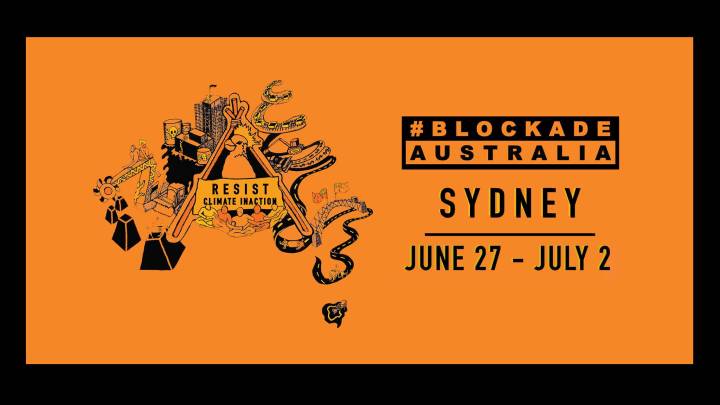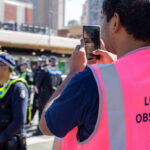Proceeds of Crime Laws Are Now Being Used to Target Climate Activists

The November crackdown on Blockade Australia climate activists in Newcastle gained widespread attention after one protester, Sergeio Herbert, was actually sentenced to hard time for his part in nonviolent direct actions that were targeting the world’s largest coal port.
Herbert was sent to prison and subsequently released on bail pending appeal, just as the Human Rights Law Centre released a report outlining that climate activists are currently “under sustained attack” from authorities in this country, in terms of increasingly repressive sanctions.
It should be noted that these committed climate activists successfully disrupted Newcastle Coal Port for an eleven day stretch, at a time when the climate crisis is escalating.
However, just as the law centre has warned, the activist’s triumph has been met with increasing repression, which has further seen NSW police determine it would be exercising laws specifically designed to target the “Mr Bigs of crime” in order to confiscate a young woman’s station wagon.
Under section 42C of the Confiscation of Proceeds of Crime Act 1989 (NSW), NSW police has placed a freezing order upon 26-year-old Sasha’s 2018 Hyundai Kona station wagon – which she’d been living in – for her suspected part in the actions. And now a court will decide whether to keep it.
Civil Liberties Australia (CLA) has raised umbrage over this move, as it’s been campaigning against the misuse of proceeds of crime laws nationwide for over a decade.
And the rights group has long been asserting that, as is apparent in Sasha’s case, these laws are being used to target anyone but crime bosses.

The proceeds of climate activism
“These proceeds of crime laws are being abused by police, in every state and territory of Australia, and federally,” CLA president Bill Rowlings told Sydney Criminal Lawyers.
“In every parliament, when they were introduced, pious politicians stood up and said almost identical words: these laws will only be used to target the Mr Bigs of crime – Well, that’s now a 20 year lie.”
Recovering crime proceeds laws were rolled out in all state and territory jurisdictions, commencing in the mid-1980s through to the early 90s. And these laws were spruiked as a “measured response” to organised crime but have since been widely derided due to how they’re being applied.
“These laws are being used in some cases to target the little bloke or woman, as the case of the young female protestor proves,” Rowlings continued.
Sasha was stopped and arrested on 17 November as she was driving through the Hunter Wetlands National Park. The climate activist was then charged on suspicion of being involved in the actions. And she was sentenced to a 24-month community correction order and fined thousands of dollars.
Not only did NSW police take away the car the young woman had been living in, but it also confiscated all of her belongings.
“The police are desperate to intimidate and suppress necessary action and are intent on taking everything that they can get their hands on, to wring us dry,” Sasha said in a statement on 7 December, the day after NSW police confirmed it had imposed the freezing order.
A brief history of nabbing property
The Wran government first passed laws to confiscate the profits from crime in 1985. But these laws were soon updated by the Greiner government when it enacted the current Confiscation of Proceeds of Crime Act 1989 (NSW) (POCA).
However, it was the Carr government’s Confiscation of Proceeds of Crime Amendment Bill 2005 that implemented the freezing notice system – contained under part 3 division 1A of the POCA – that’s currently being used to appropriate the vehicle that Sasha was driving.
Section 42C of the POCA empowers a NSW police officer to issue a freezing notice. This permits the seizure of “tainted property” – that which is “used in, or in connection with, the commission of” a serious offence – if an individual has been or is soon likely to be charged with that offence.
Sasha’s 2018 Hyundai Kona is now in the custody of NSW police commissioner Mick Fuller, in accordance with section 42D of the POCA.
Section 42M of the POCA requires that the court that dealt with the owner of the seized property deliberate on whether it should be forfeited to the state. And if it is to be permanently taken, the property is then to be disposed of and any proceeds are to be retained and distributed by the state.
In his September 2005 reading speech on the amendment bill, then NSW attorney general Bob Debus set out that the new system was being implemented with a range of other changes to the law that were designed to deal with drug traffickers and the profits derived from the drug trade.

Abuse of powers
“The targeting by NSW police of the young female protestor whose only real asset appears to be a three-year old vehicle shows just how much, and how far, such laws can be abused,” Rowlings made clear, adding that “if you give police excessive powers, they will eventually be abused.”
Another example of this overreach Rowlings pointed to is this state’s 2012 consorting laws, which were passed specifically to target outlaw motorcycle gangs, yet the 2016 NSW Ombudsman report found First Nations people made up 37 percent of those police applied the laws to.
This trend in trampling over the rights and liberties of citizens on the part of government and law enforcement, Rowlings continued, has further been evident over the last two years with the excesses that have been seen in the policing and restrictions rolled out during the pandemic.
The civil liberties advocate set out that the broader picture around proceeds of crime laws entails departments of prosecutions having taken on more lawyers of late, in an effort to determine which cases are the most profitable to pursue in terms of the proceeds of crime.
“We need much better monitoring and reporting on police and prosecutor behaviours by paid independent observers,” Rowlings concluded, “and we need judges and the courts to correct excesses, like targeting this young female protestor and her Kona car.”








